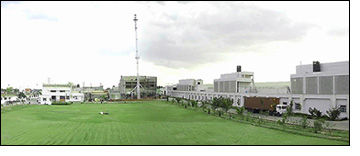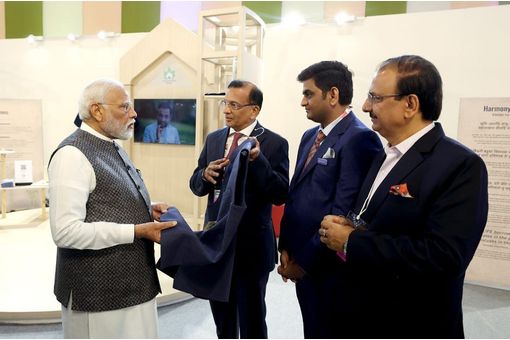Interviews
News Flash
'EBIDTA very important to achieve sustainability of business' – Dinesh, Nitin Spinners
09 Nov '11
9 min read

A visit to the cotton spinning plant turns in to an enlightening experience. Despite such a huge capacity of spindles and rotors, the shop floor is neat and clean and workers are negligible in number. Dinesh attributes this to the high level of automation.
Today, Nitin Spinners operates 80,000 ring spindles, 3,000 open-end rotors and 31 knitting machines, all with current generation and latest technology. Current yarn output is around 2,000 tons per month and 400 tons per month of knitted fabrics. It also has its own captive thermal generation plant, which too with the passage of time, has been upgraded from diesel to furnace oil and now thermal power.
Discussing their future plans, he says, “After becoming a reasonable player in terms of volumes, I would now like to add value to the yarns and fabrics that we produce. So next on the agenda is setting up a weaving as well as a fabric processing plant. Also on the agenda, is producing high value and specialty yarns like slub yarns, lycra yarns, etc. Technical textiles is one more area which we foresee getting in to the next few years”.
Dinesh however does not believe in only looking at the topline. He says, “In the initial ten to fifteen years, we only concentrated on revenues, but now I am on a different thought process and am looking forward to attaining long term sustainability for Nitin Spinners.
“In order to achieve long-term sustainability, it is very necessary to have decent and healthy EBIDTA margins. I aim to take the EBIDTA margins of Nitin Spinners in a range of 23-25 percent from the 18 percent last year. Ten years back we had EBIDTA margins of just 10-11 percent and five years back we averaged 14-15 percent”.
“My second vision is to keep the debt of Nitin Spinners under control as I have seen textile companies, who chased high growth rates, struggling under high debt burdens. The recession of 2008 opened up my eyes to the actual realities, which in turn has changed the way I now look at our textile business”.
Dinesh is of the firm opinion that the 'Just in Time' concept cannot be applied to the textile industry for the simple reason that the textile industry is a very complex business and one has to confront many variables, which change on a daily basis.
When quizzed about the reasons for a few textile mills across India falling by the wayside, while those in Rajasthan and Tamil Nadu have grown in strength, he informs, “The main reason is hands on involvement. second, keeping extreme control on costs and third, holding a tight rein on finances”.
Nitin Spinners as part of Corporate Social Responsibility (CSR) activities conducts medical camps including eye camps. The bigger initiative it takes is providing free education and books to deserving school students within a 20 kms radius of the company. Apart from this, the company handsomely donates to community trusts which in turn manage old age homes, etc.
His Mantra for success – Be fully involved as well as give your 100 percent commitment in whatever you do and there is no way success can elude you.
His advice to other second generation textile leaders – “Think differently as this industry needs innovation and needs to move away from the traditional way of thinking and doing business. This might pave a path for your grandchildren to carry on the family legacy”.
Today, Nitin Spinners operates 80,000 ring spindles, 3,000 open-end rotors and 31 knitting machines, all with current generation and latest technology. Current yarn output is around 2,000 tons per month and 400 tons per month of knitted fabrics. It also has its own captive thermal generation plant, which too with the passage of time, has been upgraded from diesel to furnace oil and now thermal power.
Discussing their future plans, he says, “After becoming a reasonable player in terms of volumes, I would now like to add value to the yarns and fabrics that we produce. So next on the agenda is setting up a weaving as well as a fabric processing plant. Also on the agenda, is producing high value and specialty yarns like slub yarns, lycra yarns, etc. Technical textiles is one more area which we foresee getting in to the next few years”.
Dinesh however does not believe in only looking at the topline. He says, “In the initial ten to fifteen years, we only concentrated on revenues, but now I am on a different thought process and am looking forward to attaining long term sustainability for Nitin Spinners.
“In order to achieve long-term sustainability, it is very necessary to have decent and healthy EBIDTA margins. I aim to take the EBIDTA margins of Nitin Spinners in a range of 23-25 percent from the 18 percent last year. Ten years back we had EBIDTA margins of just 10-11 percent and five years back we averaged 14-15 percent”.
“My second vision is to keep the debt of Nitin Spinners under control as I have seen textile companies, who chased high growth rates, struggling under high debt burdens. The recession of 2008 opened up my eyes to the actual realities, which in turn has changed the way I now look at our textile business”.
Dinesh is of the firm opinion that the 'Just in Time' concept cannot be applied to the textile industry for the simple reason that the textile industry is a very complex business and one has to confront many variables, which change on a daily basis.
When quizzed about the reasons for a few textile mills across India falling by the wayside, while those in Rajasthan and Tamil Nadu have grown in strength, he informs, “The main reason is hands on involvement. second, keeping extreme control on costs and third, holding a tight rein on finances”.
Nitin Spinners as part of Corporate Social Responsibility (CSR) activities conducts medical camps including eye camps. The bigger initiative it takes is providing free education and books to deserving school students within a 20 kms radius of the company. Apart from this, the company handsomely donates to community trusts which in turn manage old age homes, etc.
His Mantra for success – Be fully involved as well as give your 100 percent commitment in whatever you do and there is no way success can elude you.
His advice to other second generation textile leaders – “Think differently as this industry needs innovation and needs to move away from the traditional way of thinking and doing business. This might pave a path for your grandchildren to carry on the family legacy”.
Fibre2fashion News Desk - India
Popular News
Leave your Comments
Editor’s Pick
































-Ltd..jpg?tr=w-120,h-60,c-at_max,cm-pad_resize,bg-ffffff)





.jpg?tr=w-120,h-60,c-at_max,cm-pad_resize,bg-ffffff)
.jpg?tr=w-120,h-60,c-at_max,cm-pad_resize,bg-ffffff)






